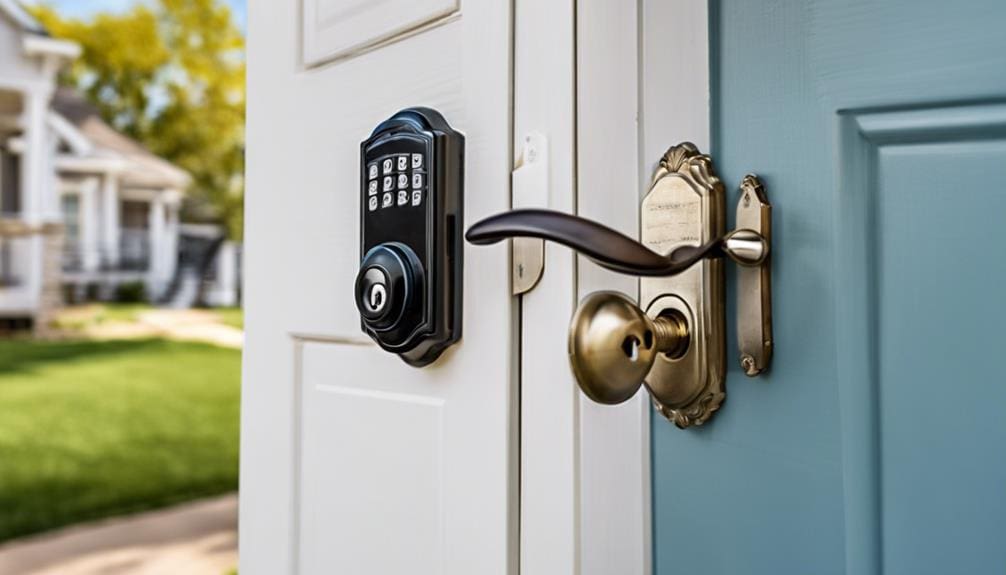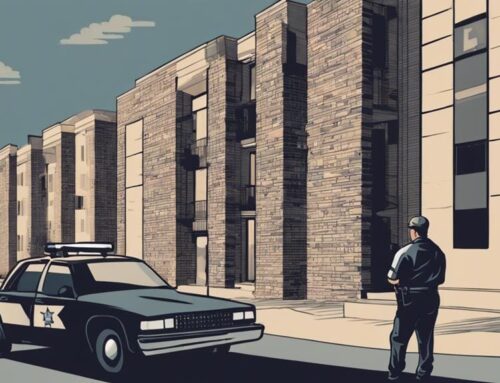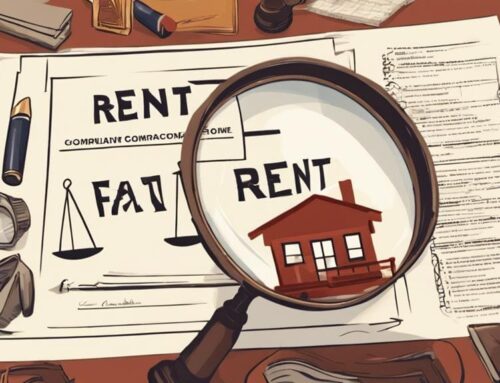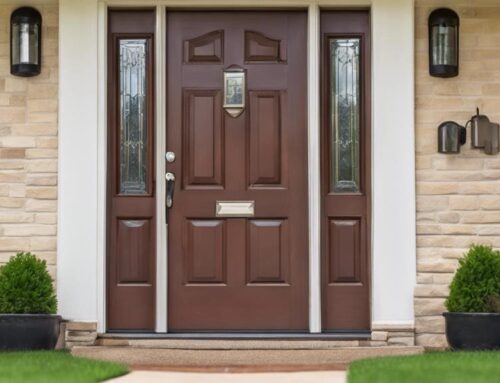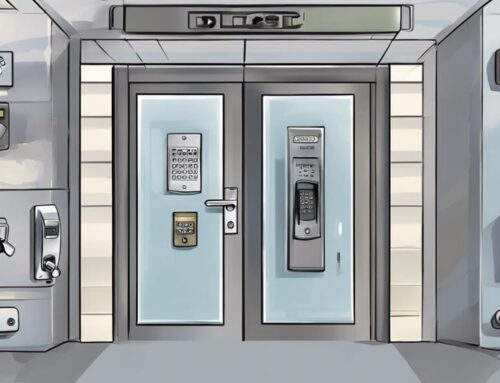You must follow Texas door lock laws to guarantee tenant safety and comply with legal standards. Installing keyless deadbolts, door viewers, and rekeying locks within seven days of a new tenant moving in is mandatory. Non-compliance can lead to lease termination, increased liability, and potential lawsuits. These laws foster community trust and protect your investment by reducing the risk of security breaches. Maintaining legal obligations helps you avoid fines and reputational damage. Understanding these requirements not only secures your property but also upholds your duty as a responsible landlord. Discover more about these critical regulations and their implications.
Key Takeaways
- Ensuring tenant safety and trust is a priority.
- Compliance avoids legal repercussions and fines.
- Rekeying and security devices reduce liability in case of break-ins.
- Non-compliance can lead to lease termination by tenants.
- Upholding laws protects the landlord’s reputation and investment.
Tenant Safety and Security
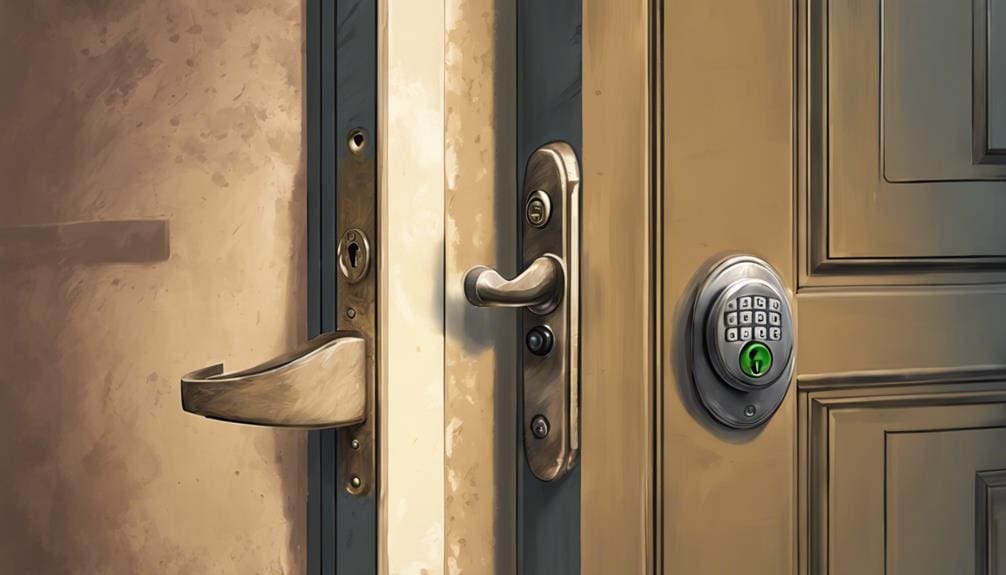
Promoting tenant safety and security is a legal obligation for Texas landlords, necessitating strict adherence to door lock laws. One vital measure involves the installation of a keyless deadbolt on all exterior doors. This modern security feature not only enhances tenant safety but also fosters a sense of community trust and belonging.
By implementing keyless deadbolts, you’re providing a secure living environment that meets legal standards and promotes tenant peace of mind.
In addition to keyless deadbolts, landlords must make sure that door viewers, or peepholes, are installed on every exterior door. This simple yet effective device enables tenants to verify the identity of visitors without compromising their safety.
Such measures underscore your commitment to tenant security and reflect compliance with state mandates, reinforcing a sense of protection and confidence among your residents.
Moreover, the mandatory rekeying of locks within seven days of a new tenant moving in is an essential step. This requirement, which can’t be charged to the tenant, further ensures that each resident enjoys an exclusive and secure access to their home.
Legal Compliance and Consequences

Failure to adhere to Texas door lock laws can lead to severe legal repercussions, including the tenant’s right to terminate the lease immediately. The Texas Property Code mandates that landlords comply with specific security device requirements to safeguard tenant safety. Ignoring these regulations not only jeopardizes the tenant’s security but also increases your liability in the event of a break-in.
Compliance with the Property Code is essential. If your property doesn’t meet these legal standards, you risk facing lawsuits, fines, and potential damage to your reputation. Tenants are well within their rights to demand these protections, and failure to provide them can result in immediate lease termination, thereby impacting your rental income and occupancy rates.
Moreover, the law requires that you rekey locks within seven days of a new tenant moving in. This expense can’t be transferred to the tenant. This critical step underscores the importance of maintaining a secure environment for your tenants, aligning with the Property Code’s objectives.
Strictly following these laws not only protects your business legally but also fosters a sense of belonging and trust among your tenants, ensuring long-term occupancy and community stability.
Rekeying Requirements
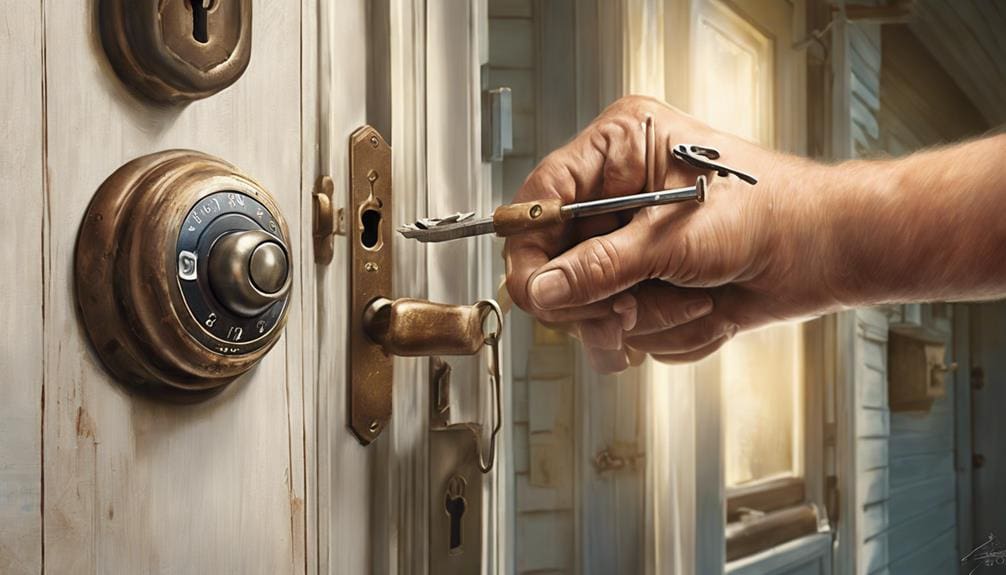
As a Texas landlord, you must rekey all exterior door locks within 7 days of a new tenant’s move-in date, ensuring compliance with state law.
This cost can’t be transferred to your tenants, making it an essential part of your operational budget.
Non-compliance can lead to legal ramifications and potential lease termination by tenants.
Tenant Move-In Deadline
Texas landlords must rekey all exterior door locks within seven days of a new tenant’s move-in to comply with state security regulations. This requirement guarantees that new tenants are provided with the highest level of protection from potential security threats. The Texas Property Code mandates this rekeying to prevent previous tenants or unauthorized individuals from retaining access to the property.
By adhering to this seven-day deadline, you show a dedication to your tenants’ safety and legal compliance. Failing to rekey locks within this timeframe can lead to significant consequences, such as allowing tenants to cancel their lease agreements without penalty. This emphasizes the importance of timely action and meticulous attention to detail in property management.
Furthermore, landlords must make certain that keyless deadbolts are installed on all exterior doors, including those leading to the garage, to further strengthen security measures. This responsibility can’t be transferred to the tenant and must be included as part of the landlord’s duties.
Cost of Compliance
Adhering to rekeying requirements within the specified timeframe not only guarantees tenant safety but also incurs certain costs that landlords must absorb. Rekeying locks within 7 days of a new tenant moving in is a non-negotiable mandate under Texas law. As a landlord, you can’t pass these expenses onto your tenants. Failing to comply can lead to legal consequences and even lease cancellations, emphasizing the necessity of this investment in security.
Here’s a snapshot of potential costs involved:
| Item | Estimated Cost |
|---|---|
| Rekeying Locks | $75 – $150 per lock |
| Keyless Deadbolts | $50 – $200 per unit |
| Additional Security | $100 – $300 |
Ensuring all exterior doors are equipped with keyless deadbolts and other required security devices is part of the compliance process. These measures not only protect tenants but also shield you from potential risks and liabilities. The initial outlay for these security enhancements might seem substantial. However, the long-term benefits, such as tenant satisfaction and reduced legal exposure, make the cost of compliance a prudent investment. By adhering to these regulations, you foster a secure living environment, enhancing your reputation and ensuring tenant loyalty.
Required Security Devices
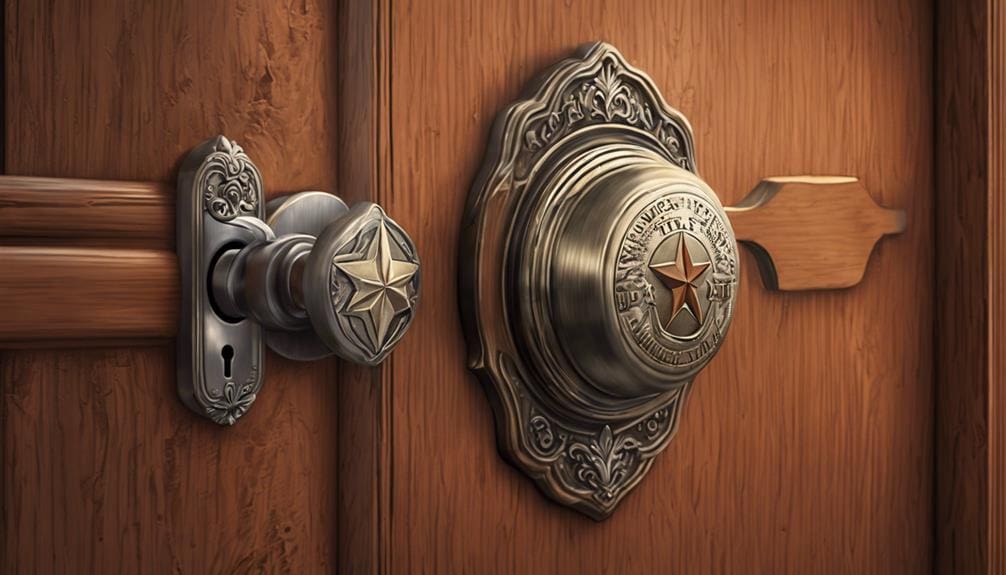
Landlords in Texas must make sure that keyless deadbolts, door viewers, and other mandated security devices are properly installed on all exterior doors. Ensuring these security measures isn’t only a legal requirement but also fosters a sense of safety and trust among tenants. A keyless deadbolt, visible only from the interior side, prevents unauthorized entry even if a key is compromised.
Equally important, each exterior door must have a door viewer, allowing tenants to identify visitors without opening the door, thereby enhancing personal security.
Additionally, sliding patio doors in rental properties require a pin lock and a locking handle. This dual locking mechanism provides an extra layer of protection against break-ins. Exterior windows must also have at least one functioning latch to secure the premises effectively. By adhering to these regulations, you reinforce your commitment to tenant safety and compliance with Texas law.
Failure to meet these legal standards can have significant repercussions, including the potential for lease cancellation by the tenant. As a landlord, staying vigilant about these requirements not only minimizes your liability but also strengthens your reputation as a responsible and considerate property owner.
Liability and Lease Implications
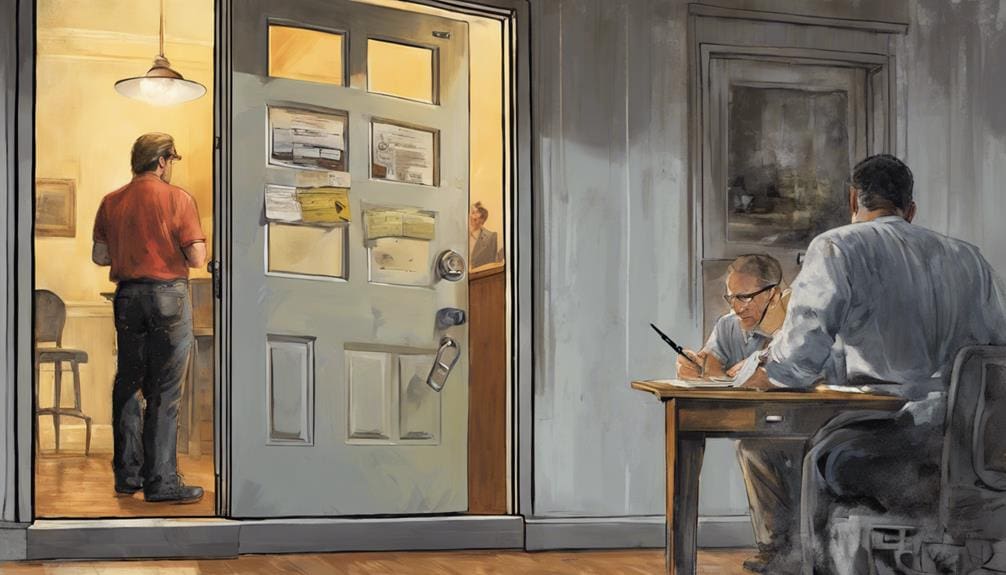
Failure to comply with Texas door lock laws greatly increases your liability in the event of a break-in or security breach. Legal non-compliance can empower tenants to cancel their leases with full legal support.
Ensuring that all exterior door locks are rekeyed within 7 days of a new tenant moving in is essential to meet these requirements.
Increased Break-In Risks
Neglecting Texas door lock laws greatly heightens the risk of break-ins, increasing a landlord’s liability and potentially leading to lease terminations. When you fail to secure exterior doors with keyless deadbolts and rekey locks within seven days of new tenants moving in, you not only compromise the safety of your property but also expose yourself to significant legal and financial risks.
By not adhering to these regulations, you create an environment where tenants feel unsafe, which can lead them to terminate their leases prematurely. This not only disrupts your rental income but also damages your reputation as a responsible landlord. Properly installed security devices on exterior doors are essential in maintaining a safe rental environment and ensuring tenants feel secure in their homes.
Moreover, increased break-in risks can result in higher liability costs for you as a landlord. Should a break-in occur due to inadequate security measures, you could be held responsible for tenant losses and damages.
Ensuring compliance with Texas door lock laws isn’t merely a legal obligation; it’s a crucial step in fostering trust and security within your rental community. Prioritizing tenant safety fortifies your standing as a reputable landlord and protects your investment.
Legal Non-Compliance Consequences
Disregarding Texas door lock laws directly exposes you to increased liability and legal consequences, including potential lease cancellations by tenants. As a landlord, adhering to these laws isn’t just a recommendation but a legal obligation.
Failing to install keyless deadbolts and other mandated security devices on exterior doors leaves you vulnerable to lawsuits, especially in the unfortunate event of a break-in or security breach.
Your tenants rely on you to provide a safe living environment. When you neglect door lock laws, you compromise their safety, which can result in disputes and legal consequences.
Tenants have the right to demand proper security measures, and if you fail to comply, they can legally cancel their lease agreement. This not only disrupts your rental income but also tarnishes your reputation as a responsible landlord.
Remaining compliant with Texas door lock laws ensures you avoid potential legal issues and maintain a harmonious relationship with your tenants. It’s crucial to understand that your responsibility extends beyond collecting rent; it includes safeguarding your property and the well-being of those who reside in it.
Don’t overlook the importance of these regulations if you aim to foster a trustworthy and secure rental community.
Tenant Lease Cancellation
As a landlord, you must understand that non-compliance with Texas door lock laws allows tenants to cancel their lease due to your increased liability and failure to meet property code requirements. Ensuring all exterior doors have the required keyless deadbolts and security devices isn’t optional—it’s a legal obligation. Failure to comply not only jeopardizes your lease agreement but also exposes you to significant liability in the event of a break-in or security breach.
Rekeying locks within seven days of a new tenant moving in is mandatory. Ignoring this requirement can lead to legal repercussions and the potential for tenants to legally cancel their lease agreement. This action can result in financial loss and increased vacancy rates. Therefore, adhering to these lock laws is essential for maintaining a safe, compliant rental property.
Understanding and following Texas lock laws can help you avoid disputes or legal issues with tenants. They’re not just about legal compliance; they’re about creating a secure environment where tenants feel protected and valued. Meeting these standards fosters a sense of trust and belonging, which is vital for sustaining long-term, positive landlord-tenant relationships.
Professional Assistance and Resources
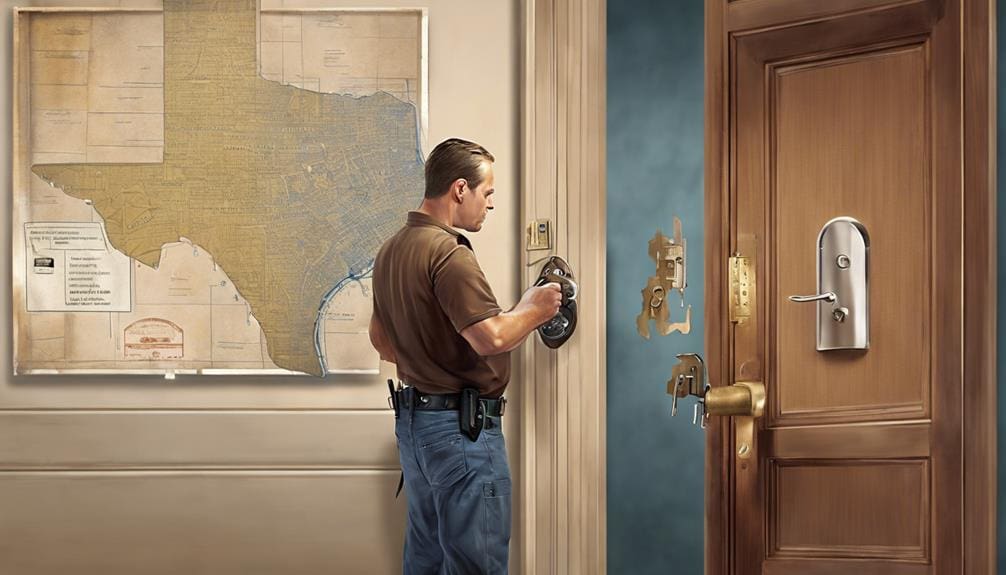
For thorough guidance on complying with Texas lock laws, landlords can rely on professional assistance from J.R. Rentals & Property Management in Copperas Cove, TX. They offer expertise on the specific security devices required under Texas Property Code Section 92.151, ensuring your properties meet all legal standards.
By securing your rental properties with the right locks and security devices, you not only comply with the law but also create a safer environment for your tenants. J.R. Rentals & Property Management can help you navigate the complexities of rekeying exterior doors within the mandatory seven-day period after a new tenant moves in. This critical step is essential to avoid legal consequences and potential lease cancellations due to non-compliance.
Additionally, the Austin Tenants Council provides valuable resources and information on locks and security requirements. These resources can be an excellent supplement to the professional guidance offered by J.R. Rentals & Property Management.
Ensuring compliance not only protects your investment but also fosters a sense of trust and security within your tenant community. By utilizing these professional services and resources, you demonstrate a commitment to upholding the highest property management standards.
Frequently Asked Questions
Are Landlords Required to Change Locks Between Tenants in Texas?
Yes, you’re required to change locks between tenants in Texas. Specifically, landlords must rekey all locks on exterior doors within 7 days of a new tenant moving in. This guarantees a secure environment for every new resident.
It’s important to follow these regulations to avoid legal issues and foster a sense of community. Compliance with Texas Property Code helps build trust and guarantees tenant safety, reinforcing your commitment to their well-being.
Can My Landlord Lock Me Out in Texas?
No, your landlord can’t lock you out in Texas without following proper legal procedures. Texas law requires landlords to provide tenants with access to their rental property at all times. Locking you out without cause or an emergency can lead to serious legal consequences for the landlord.
You have the right to access your home, and landlords must respect and uphold this entitlement. Always guarantee your rights are protected.
Can You Refuse Landlord Entry Texas?
Imagine your landlord wants to enter your apartment without notice. In Texas, you can refuse entry if it’s not an emergency and they haven’t given reasonable notice.
For example, if your landlord appeared unannounced to show the unit to potential renters, you have the right to deny entry.
Texas law protects your privacy and peaceful enjoyment, so landlords must follow specific entry laws to avoid disputes and legal consequences.
Are Deadbolts Required in Texas?
Yes, deadbolts are necessary on all exterior doors in Texas. As a tenant, you can feel secure knowing that state law mandates landlords to install keyless deadbolts within seven days of your move-in. This guarantees your safety and peace of mind.
Moreover, landlords can’t pass on the rekeying costs to you. Compliance with these laws fosters a trustworthy landlord-tenant relationship, enhancing your sense of belonging within your community.
Conclusion
Simply put, as a Texas landlord, you must follow door lock laws to guarantee tenant safety and security. Staying compliant not only helps you avoid legal repercussions but also safeguards your reputation and financial interests.
Rekeying and installing necessary security devices are essential. By paying attention to details, you’ll reduce liability and lease complications.
Seek expert help and resources to remain compliant with the law.

